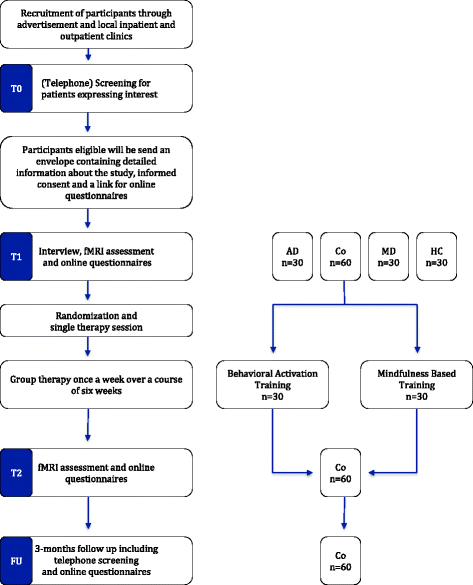From the neurobiological basis of comorbid alcohol dependence and depression to psychological treatment strategies: study protocol of a randomized controlled trial
- PMID: 28454522
- PMCID: PMC5410069
- DOI: 10.1186/s12888-017-1324-0
From the neurobiological basis of comorbid alcohol dependence and depression to psychological treatment strategies: study protocol of a randomized controlled trial
Abstract
Background: Alcohol use disorder and depression occur commonly in the community. Even though this high-prevalence comorbidity is associated with poorer posttreatment outcomes and greater utilization of costly treatment services, existing treatment trials often exclude patients with comorbid depressive and alcohol use disorders. Past research suggests that symptoms such as craving and anhedonia might be associated with alterations within the reward circuit, while emotion regulation deficits are related to disruptions within the default mode network. The aim of this clinical neuroimaging study is to transfer previous research about the reward circuit and default mode network underlying alcohol use disorder and depression to achieve a better understanding of neural signatures characterizing their comorbidity. In addition, the neurobiological results will be used to test whether two psychotherapeutic intervention programs, mindfulness-based training and behavioral activation training, are able to positively influence the identified pathomechanisms.
Methods: By means of functional magnetic resonance imaging (fMRI), 60 comorbid alcohol dependent and depressed patients are compared to 30 patients with depression only, 30 patients with alcohol use disorder only and 30 healthy control participants. Comorbid patients are randomized to either receive a behavioral activation or mindfulness based training and asked to participate in a second fMRI session and 3 month follow-up assessment. Thereby, we plan to explore whether these brief group psychotherapeutic intervention programs are able to positively influence the identified neurobiological pathomechanisms. The primary outcomes are reward and default mode network activity and connectivity evoked by paradigms measuring different facets of reward and emotion processing. Secondary outcome measures include craving and depression scores, as well as relapse rates. Predictors include participants' characteristics, personality traits and indicators of mental health.
Discussion: The objective of the project is to identify common and/or distinct neural signatures underlying the comorbidity of alcohol dependence and depression. If the neurobiological understanding of alcohol addiction and depression is improved, this could potentially serve as a key predictor of treatment response to specific types of behavioral or mindfulness therapies hypothesized to alter reward and resting state systems.
Trial registration: German Clinical Trial Register DRKS00010249 . The trial was registered January 23th 2017.
Keywords: Alcohol dependence; Behavioral Activation Training; Depression; Functional magnetic resonance imaging; Mindfulness-based training; Reward processing.
Figures
References
-
- Meyer C, Rumpf HJ, Hapke U, Dilling H, John U. Prevalence of alcohol consumption, abuse and dependence in a country with high per capita consumption: findings from the German TACOS study. Transitions in Alcohol Consumption and Smoking. Soc Psychiatry Psychiatr Epidemiol. 2000;35(12):539–547. doi: 10.1007/s001270050277. - DOI - PubMed
Publication types
MeSH terms
Associated data
LinkOut - more resources
Full Text Sources
Other Literature Sources
Medical
Miscellaneous


